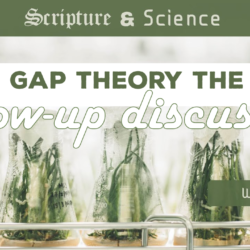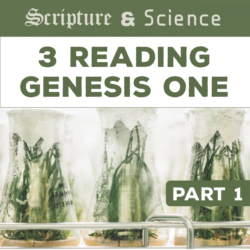This is a follow-up discussion to Will Barlow’s Scripture and Science class, part 4: Reading on Genesis One (2). If you haven’t watched or listened to that yet, you can go here or find it on the Restitutio podcast feed as episode 462 on Apple Podcasts or Spotify.
Sean Finnegan asks Will Barlow about old-earth interpretations of Genesis 1. They cover the following questions:
- You covered day-age theory and went to several verses in Genesis where a day is a not a 24-hour period of time. Then you suggested that such a secondary meaning for day doesn’t fit well in Genesis 1 due to the specificity of “evening and morning” for each day. How day-age theorists like Hugh Ross deal with this objection?
- You also mentioned how how the science fails to line up with the biblical sequence, particularly on day 4. You mentioned the idea of changing perspectives between day 1 and the rest of the creation week. Does that seem like a reasonable move to you or special pleading?
- How do old Earth proponents handle Exodus 20.11? “For in six days the LORD made heaven and earth, the sea, and all that is in them, and rested on the seventh day. Therefore the LORD blessed the Sabbath day and made it holy.”
- The second view you covered is modified day-age theory. This one has 6 regular 24-hour days, but huge gaps of time between them. Is this the same as progressive creationism?
- I could see modified day-age theory fitting in with theistic evolution as well. God sets up the system and lets it run for a while. He steps in a critical moments along the way to guide the process, but mostly remains hands-off during development.
- The third view you looked at was relativistic day-age theory of Gerald Schroeder. You said you were fascinated by his view, but also doubtful that it holds water. You mentioned his way of reading evening and morning as order and disorder. Why don’t you find that convincing?
- The fourth theory was to read Genesis non-literally as the Biologos folks do like Francis Collins and Tremper Longman. How do they make sense of it? Is it allegorical or metaphorical or what is the meaning of it from their reading? Also, do you know how they justify going metaphorical on Genesis 1 while holding to a literal reading of other narratives, such as in the Gospels?
- You said day-age, modified day-age, relativistic day-age, and the non-literal evolutionary approach all start with science and then move to scripture. How do you think of scripture and science contradictions? Should scripture always take precedence or should we look for alternative interpretations over face-value readings when this happens?







Thank you, Sean and Will, for your further discoursing.
Here’s my comments :
1. These differing views on Genesis 1-2 are all exceedingly interesting, but it wouldn’t affect my faith whichever of these particular views is right (or ‘more right’ – than the others). The ‘bottom line’ is that we are here, by the grace of God – and we all need spiritually redemption.
2. Most Christians (myself included) essentially know ‘diddly-squat’ about molecular biology and so we are not in a position to properly evaluate the current view of ‘Theistic Evolution’. What we ideally need is an honest simplification of the findings of the Genome Project so to help distinguish the indubitable hard facts from any wishful theorising.
3. Here’s at least one good thing about Augustine, Sean. I once asked Professor Jimmy Dunn who he thought was closer to the overall truth regarding the natural human condition – Augustine or Pelagius ? Jimmy Dunn replied that he was with Augustine – although Jimmy rejected Augustine’s particular notion of inherited Adamic guilt.